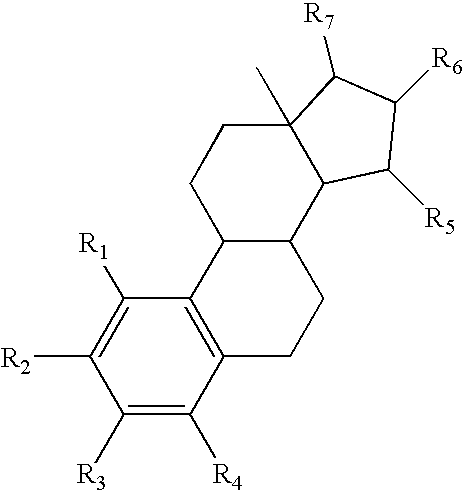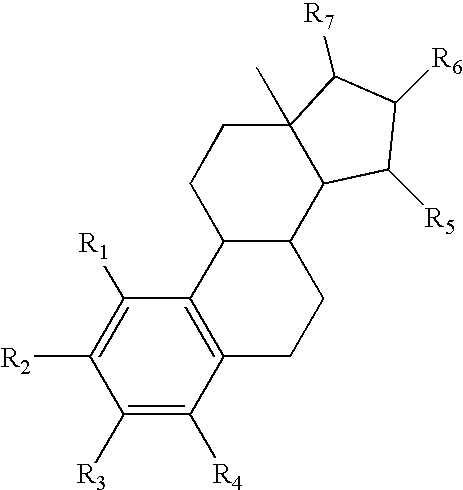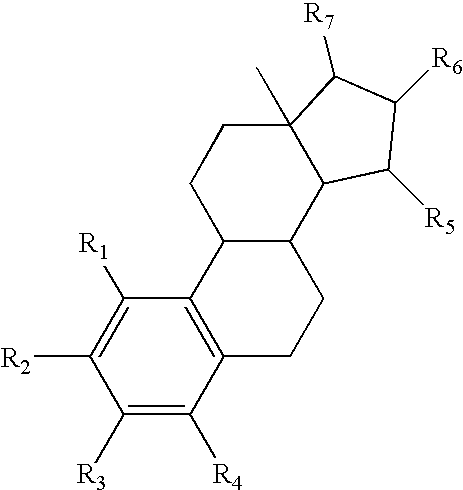Use of estrogen compounds to increase libido in women
a technology of estrogen compounds and libido, which is applied in the direction of drug compositions, biocide, sexual disorders, etc., can solve the problems of low libido, lack of ability to achieve orgasm, and lack of interest in sexual intercourse, so as to improve libido in women
- Summary
- Abstract
- Description
- Claims
- Application Information
AI Technical Summary
Benefits of technology
Problems solved by technology
Method used
Image
Examples
example 1
[0080] Vaginal cornification was chosen as a tissue-specific and estrogen-sensitive endpoint to determine the estrogenicity of estetrol (E4), after both oral and subcutaneous administration, in hypoestrogenic rats. 17.alpha.-ethinylestradiol (BE), 17.beta.-estradiol (E2) and vehicle (10% ethanol / sesame oil) served as controls in these bioassays.
[0081] Uterine weight increase in the rat is more commonly used as a measure of estrogenicity. However, uterine weight also responds to progesterone, testosterone, and other agents not characteristically regarded as estrogens. In the early 1920s it was discovered that follicular fluid from the pig ovary contained a factor(s) that caused cornification / keratinization of the vaginal epithelium in the rat (Allen and Doisy, 1923, JAMA, 81,.819-821; Allen and Doisy, 1924, Am. J. Physiol., 69, 577-588). The so-called vaginal cornification response in rats subsequently provided a bioassay for testing estrogenicity. Vaginal epithelial cornification / ke...
example 2
[0085] To evaluate the oral (po) and subcutaneous (sc) bioavailability of estetrol (E4) and to determine the elimination half-life, single dose studies were performed in female Sprague Dawley rats followed by frequent blood sampling over a 24 hours interval.
[0086] Female Sprague Dawley rats were equipped with a permanent silatic heart catheter, as described by Kuipers et al. (19S5? Gastroenterology, 88, 403-411). Rats were allowed to recover from surgery for 5 days and were than administered 0.05, 0.5, or 5 mg / kg E4 in 0.5 ml arachis oil. For sc administration, E4 was injected in the neck area using a 1 ml syringe and 20 g needle. For po administration of E4, rats were lightly anaesthesized with halothene / N.sub.2O / O.sub.2 and E4 was directly applied intragastrically using a plastic stomach intubator. Blood samples were subsequently collected via the heart catheter in heparinized tubes at 0.5, 1, 2, 4, 8 and 24 hours. Erytlrocytes were removed by centrifugation at 5000.times.g for 10...
example 3
[0088] Established competitive steroid binding assays were used to determine the relative binding affinity of estetrol (F4), as compared to 17.alpha.-ethinylestradiol(EE) and 17.beta.-estradiol (E2), to human Estrogen Receptor (ER) .alpha.- and .beta.-forms.
[0089] The method employed was adapted from the scientific literature and described in detail by Osbourn et al. (1993, Biochemistry, 32, 6229-6236). Recombinant human ER.alpha. and ER.beta. proteins were purified from transfected Sf9-cells. The in vitro assays involved the use of either ER.alpha. or ER.beta. proteins and [.sup.3H]E2, at a fixed concentration of 0.5 nM, as the labeled ligand. Recombinant human ER.alpha. or ER.beta. proteins were dissolved in binding buffer (10 mM Tris-HCL, pH 7.5, 10% glycerol, 1 mM DTT, 1 mgg / ml BSA) and duplicate aliquots were then incubated with [.sup.3 H]E2 at a final concentration of 0.5 nM, together with a vehicle control (0.4% DMSO), or the same amount of vehicle containing increasing conce...
PUM
 Login to View More
Login to View More Abstract
Description
Claims
Application Information
 Login to View More
Login to View More - R&D
- Intellectual Property
- Life Sciences
- Materials
- Tech Scout
- Unparalleled Data Quality
- Higher Quality Content
- 60% Fewer Hallucinations
Browse by: Latest US Patents, China's latest patents, Technical Efficacy Thesaurus, Application Domain, Technology Topic, Popular Technical Reports.
© 2025 PatSnap. All rights reserved.Legal|Privacy policy|Modern Slavery Act Transparency Statement|Sitemap|About US| Contact US: help@patsnap.com



